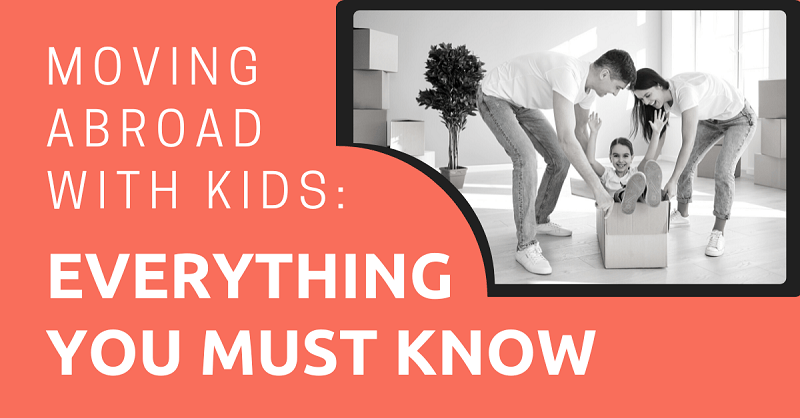
Moving across the city with children isn’t easy, now imagine moving across the world with them.
If you’ve landed here, that means you’re either thinking about moving abroad with kids or you’re being forced to for work.
Either way, this guide will help make the transition abroad with children easier and point you to all the right resources for meeting other expats, learning the local language, and protecting your family.
This article will take approximately 16 minutes to read. Don't have the time right now? No worries. You can email the ad-free version of the article to yourself and read it later!
Disclaimer: This article may include links to products or services offered by ExpatDen’s partners, which give us commissions when you click on them. Although this may influence how they appear in the text, we only recommend solutions that we would use in your situation. Read more in our Advertising Disclosure.
Contents
- Preparing for Your Move Abroad
- Packing Your Bags
- Adapting to Life in a New Country
- Medical Care
- Allergies
Preparing for Your Move Abroad
Living abroad can be an unforgettable experience. However, it can cause a lot of stress for your kids. Taking your children away from friends and family and bringing them to a new environment might upset them. Therefore, you need to ease the stress of the change.
Good communication is a must. You need to explain to your kids why you’re making this change and what benefits it will bring. Do not forget to ask for their opinions and listen to their concerns. Involving them in the process by deciding together on accommodation and schools might make them feel that their opinion matters. It will soften the transition.
Also, try to keep things under control so your children do not feel chaos with this move. Before moving, prepare a list of things you need to take care of. This list should include such things as finding:
- medical care
- nurseries
- kindergartens
- schools
Navigating activities for them will be beneficial.
An agency can help you with these tasks if you’re a busy parent. Some companies offer help with relocation packages. So, you might want to ask about this.
Researching and getting things done beforehand will help you avoid unnecessary steps.
Visas
You will need a working visa, and your family will need a family visa.
A family visa is a document that helps to unify the family (your children or spouse.) Some countries offer a partner visa as well. It’s better to verify the local law for same-sex partners’ visas.
To get a family visa, you might complete these four steps:
- navigate the consulate or visa-center
- download the application and check the required documents
- fill out the application
- prepare all necessary documents
- apply for an interview at the consulate or visa-center
To prove your spouse or partner status, you might need a marriage certificate, certificate of registration, or proof of cohabitation. You can prove the parent’s status with a child’s birth certificate. The documents need to be translated and verified into either English or the local language.
Insurance
Good insurance is always a plus, especially if you relocate with kids. Some countries also require that foreigners obtain insurance for entry.
Companies often provide insurance coverage in an expat package. If you need to get insurance yourself, check the international plans that are common among expats. Read and understand the terms of the coverage and what is included.
Cigna Global provides insurance packages for expat families. Depending on the package you choose, they can cover all the pediatrician visits, vaccines, medical treatments, pregnancy, and birth plans.
Accommodations
You can search for accommodations before arriving in your new country. It can save you time once you are there. You can navigate well-liked districts among expat families and contact real estate agencies. Give them your requirements and ask them to prepare a visit once you arrive.
It will be good to mention that apartments need to be close to schools, children’s hospitals, parks, and playgrounds.
You can check some expat community groups to get an idea about the rental market and ask what districts are safe. ExpatDen provides articles about renting apartments around the world.
Getting a serviced apartment for the first months or days might be a better option for the families than a hotel. They are more spacious and have kitchens, gyms, swimming pools, cleaning services, and playrooms.
Overall, they give more feeling of home than hotels. You can get this type of apartment for a short term, and while you’re there, you can check other options.
Avoid signing any leases before your arrive. It’s always important to see what you’re paying for.
Kindergartens and Schools
Moving before the school year starts is ideal. In this case, the education of your children will not be disrupted.
It’s better to find a school before you relocate. If there is an available spot for your kids, the school can arrange an online interview.
The costs vary in location and type of school. Europe and North America have the most expensive international schools in the world.
Also, you may have to pay the fee for enrollment, books, transportation, food, uniforms, and extra-curricular activities.
Language is another important factor here. Local public schools might be okay if your child speaks the language. Expats often prefer international private schools and kindergartens for their children.
The biggest city might have English, French, Spanish, and German schools.
Costs
Relocation with kids is not cheap. Be prepared to cover the costs of education, such as tuition fees, transportation, meals, and extra-curricular activities.
The education costs will depend on the prestige of the private school and its location. But to get an idea, you may pay up to US$2,000 for a private elementary school in Shanghai and up to US$500 for a school in Mexico City (without inscription costs).
In Bangkok, costs might be cheaper. The prices range between US$50 to US$200 per month. When it comes to Europe, you will pay around US$1,000 for your kid’s education in Barcelona or Copenhagen.
In addition to education costs, you might have to pay for medical expenses in your destination country and transportation costs (plane tickets, transportation in the city).
If both parents work, you need a nanny to bring and pick up your kids from school. The costs will vary in the country and the nanny’s qualifications. For instance, Thailand or China have qualified nannies for reasonable prices. You will pay around US$6 per hour for a nanny’s services in Shanghai or Bangkok.
Mexico also might offer convenient options. You might get a nanny for US$5 per hour. In Europe, costs might be a bit higher. Babysitters will cost US$12 per hour in Barcelona and around US$20 in Copenhagen.
Packing Your Bags
Being organized is a step toward a successful and less stressful relocation with children. Prepare your kids’ packing list to not forget about any essentials.
You can divide it into categories such as travel, school, and medical, and enter items whenever you think about it.
Essential travel documents would be a passport and visa. However, do not forget their birth certificates, which you might need when applying for residence cards or registering your kids at the police station. Check with the new school which documents they require for entry. Bring medical records and a vaccination book.
Here are some other things to pack.
- Clothes: besides the clothes you have packed, bring extra clothes for the plane, especially if you are traveling with babies. Pack also for you. You do not know how often a baby can vomit.
- Entertainment: bring your kids’ favorite toys, books, and bedding. It will comfort them in their new environment.
- Medication: take all the medicine your child might need. Bring spares if you cannot get it in the new country.
- Vaccines: check if there are any vaccine requirements in the new country for kids. This information you might find on the consulate’s website.
- Food: think about the food items you cannot get, and bring them. For instance, if your child is gluten intolerant, check if you can get gluten-free foods. If you give formula to your baby, check if it is available.
Adapting to Life in a New Country
Depending on your kids age, relocation can affect them on a large or small scale. Moving with an infant or a baby will be less stressful — they are not aware of the changes.
Being close to the mother will help children adapt. Although you will be busy with relocating, try to give them all the time they need after arrival. It will help to soften the stress.
Toddlers might notice the change more than infants. Keeping the same routine as you had at home might be beneficial.
Bring all their favorite toys, play the same music before sleeping, and watch the same cartoons. These minor details will provide them with a sense of stability.
The kindergarten or school-age children are the ones who will be affected the most since they are leaving behind their favorite places and friends.
When searching for schools, consider finding activities for your kids, especially if you are moving during the holidays. The holiday period may be convenient for relocation.
However, moving will slow down make friends for your kids. Therefore, you can find some activities for them. Tennis, swimming, dancing, and language courses are all activities they can do immediately after arrival.
Some parents bring their kids back home for the holidays soon after arrival. Try to avoid it. It can make it harder for them to adjust to a new country. Wait for your child to make friends, establish a new routine, and then visit your relatives and friends back home.
To help your child adapt to the new country, try to connect with the people who have children of the same age.
Expats form close-knit communities, and there are many organizations to help you integrate into the new culture. Attending their meetings is a great way to meet people.
Language
You can learn the language together as a family. Make learning more fun by singing songs and learning poems.
After moving, you can find the schools that offer language courses and register your kid for a course. It may work for both of you. They can make new friends, and you will have time to find a place to stay.
Culture
Unfortunately, getting used to a new culture might not be easy for kids. It might be even more challenging if the country varies from your home.
You can grow their interest in the new culture before moving.
To begin with, you can take a language course together. It might be an online or offline course with a native speaker. When looking for a tutor, pay attention to how passionate he or she is about the country and culture, as they can encourage your kids to love it.
Watching movies, listening to music, and trying food from this country might help to grow curiosity. Find your children something they might enjoy.
Once you have arrived, embrace the new culture together. You can participate in local celebrations and learn the history of the country together with your kids. You need to show your children open-mindedness and respect when embracing a new culture and explain the differences with appreciation.
However, it is important to continue teaching your children about their homeland. You can cook national dishes and celebrate the holidays.
Stay connected to your family by having regular calls with them.
Medical Care
It might be challenging to find a good healthcare provider even if you did excellent research. You might seek advice from your colleagues and other expats.
Private hospitals are common choices among expats, as they provide services in English and have international standards.
You need to bring all copies of medical records with you. If your child has a medical condition, take all the documents about the medicine, recent medical tests, and doctors’ statements.
If you need to continue the immunization, you can check what vaccines are available in the destination country. WHO provides information on vaccine availability in every country. Always keep track of what vaccines they give to your child.
Allergies
Keep in mind anything you have to bring for allergies or things to avoid in the new country.
Food Allergies
New food is a potential risk for food allergies and food poisoning. Therefore, always investigate the food, and not only the components of the food but also how it is cooked. These small actions can reduce the risk:
- Learn basic phrases: how to order food, the name of the dishes, and how to communicate if the child has some food allergies. It will be useful when visiting areas where English is not spoken.
- Remember to research: check local cuisine to identify potential food allergens. Be careful when experimenting.
- Educate: teach your child how to be careful with new foods.
- Prepare: wherever you go, bring first aid kits that include medicine for food poisoning.
You can also bring an EpiPen (Epinephrine injection) with you. In some countries, it might be hard to get it.
Depending on the new area, access to international food can be limited. You can check if you can get the same formula milk and foods your baby used to eat, as changing it might upset their stomachs.
Environmental Allergies
New environments also present some challenges, as the family may not be used to the allergens in the air. To reduce this, you can get an air purifier for your house and keep the house tidy. Also, if there is a high level of pollen or pollution, limit outdoor activities for your kids.
Kids’ Activities
Finding activities for your children might keep them busy and help them make friends. It is good to keep continuing their hobbies. If your kids like swimming, check a great swimming class and register them.
Being able to continue doing what they love might make things easier.
On the other hand, encourage your children to try something new. If you are in China, check calligraphy or kung-fu classes. If you are in Brazil, learn capoeira together.
Take your daughter to flamenco classes in Spain, and bring your boy to cricket in India.
Maids and Nannies
If you need a nanny or maid, you can check international agencies like GreatAuPair. You can also ask expat communities about good local agencies.
Some agencies might charge you a service fee. However, they might find you a perfect match and save you time. They usually have bilingual nannies and maids, which can be great if English is rarely spoken in the destination country.
Research the local laws when hiring a nanny or maid. It can help to avoid any legal issues. Interviewing in person is better. It is also better to do a trial period first.
You should know who the nannies are since you’re trusting them with your kids.
Expat Friends and Communities
Expats stick together when overseas. They create many communities and organize different meetings. They also help to adapt newcomers to the new culture.
You can search for them online or check with your consulate. They can provide a list of international organizations.
Here are two popular organizations:
- InterNations. They integrate expats around the world and organize weekly meetings.
- MeetUp. They offer an online platform that connects people in their local area.
You can always search for some associations depending on your nationality. For example, there are the following:
- British Club in Bangkok
- The Alliance Française de Shanghai
- The Goethe-Institut in Mexico
- The American Society of Barcelona
The Chambers of Commerce provide plenty of networking and other services. You can check the European Chamber of Commerce and the U.S. Chamber of Commerce — among others.
You can become a member and take part in their meetings. It will help you to meet other parents who might know other organizations for children.
Safety Concerns
It is important to know about the safety risks of the new country. Here are the four top safety concerns you might face:
- Health risks. Check all the potential health risks your kids might have. You need to check about infectious diseases and vaccines against them. Check how to avoid food poisoning. For example, if tap water is not drinkable, show your kid how to be careful when brushing their teeth and showering.
- Check the crime rates and what types of crime may occur. Train your children about personal safety.
- Traffic rules are very crucial and should be on your list. Compare the rules with your home country. Teach your children about differences of, for example, crossing the streets and reading signs.
- Cultural differences might be a potential safety concern. Check the differences in behavior, dress code, and body language, and teach your children about them.
Having Another Child While Abroad
Having a baby is a memorable experience, but it also might be very stressful when overseas. All future mommies want a peaceful and pleasant pregnancy.
Getting great medical care will be the first step when planning a pregnancy and giving birth abroad.
You might need to check hospitals with great reputations and check your insurance coverage. Finding an English-speaking doctor will be helpful, as you can avoid many misunderstandings.
Every country will have a different approach to giving birth and pregnancy.
Discuss all the points essential to you, for example, epidural and the presence of the husband during childbirth.
After your baby is born, check with your consulate about his or her first passport, and with the local police about the registration process and visas.
Now, on to You
Seeing children struggling and not adjusting to the new environment might be heartbreaking for the parent. So, it’s crucial to help them ease through this transition to not affect them.
Give it time and be patient. If you have time to visit a country before you move, do it. It might help to soften the adaptation. Also, it can wake up curiosity about the new culture.
Help your children stay in touch with their friends and family back home after moving, but also encourage them to explore new surroundings and make new friends. Try to show them you want to explore the new country. They might follow your lead.







